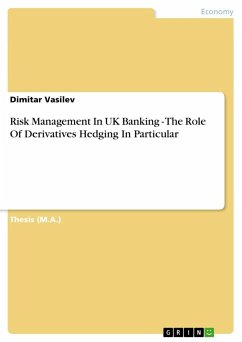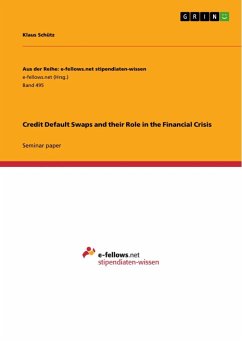
Risk Management In UK Banking - The Role Of Derivatives Hedging In Particular

PAYBACK Punkte
0 °P sammeln!
Thesis (M.A.) from the year 2010 in the subject Economics - Finance, grade: 2,0, University of Portsmouth, language: English, abstract: Risk management has been pivotal banking activity, particularly for the last 20 years. Volatileeconomic conditions and ever-growing competitive forces have compressed profit margins andforced UK banks to look up to sophisticated and more comprehensive methods of identifying optimalrisk-return positions. Advanced technology and global business focus has presented opportunities toutilize comprehensive quantitative techniques to contain and manage risk exposure. ...
Thesis (M.A.) from the year 2010 in the subject Economics - Finance, grade: 2,0, University of Portsmouth, language: English, abstract: Risk management has been pivotal banking activity, particularly for the last 20 years. Volatileeconomic conditions and ever-growing competitive forces have compressed profit margins andforced UK banks to look up to sophisticated and more comprehensive methods of identifying optimalrisk-return positions. Advanced technology and global business focus has presented opportunities toutilize comprehensive quantitative techniques to contain and manage risk exposure. Technology hasplayed crucial role in establishing and dispersing electronic trading platforms giving access to equityand derivatives hence reshaping capital acquisition and risk management frameworks. The topic ofrisk management has been even more contextual in times of severe economic/financial crisis.Analysts have not only been critical of banks' uncollateralized lending but also of their excessivetrading with derivative instruments. Assuming that no arbitrage opportunities exist, the questionremains as to whether banks attempt to hedge their risk exposure or purely speculate on thedirection of price movements. In this context, central task of this dissertation is to examine the rolederivative instruments play in the UK banking system through aggregately assessing risk position oflargest UK banks relative to aggregate trading volumes. Empirical analysis is conducted utilizing atwo-stage SUR technique. Results from first stage of empirical analysis confirm that risk premium onbanks' equity securities is strongly related to market risk premium. More importantly, findingsillustrate that exchange rate exposure of UK banks has more significant impact on stock returnscompared to interest rate risk exposure. Second stage of the analysis fails to provide comprehensiveconclusion due and produces controversial results. Nevertheless, exchange rate derivatives are foundto haveimpact on exchange rate risk albeit only marginally













